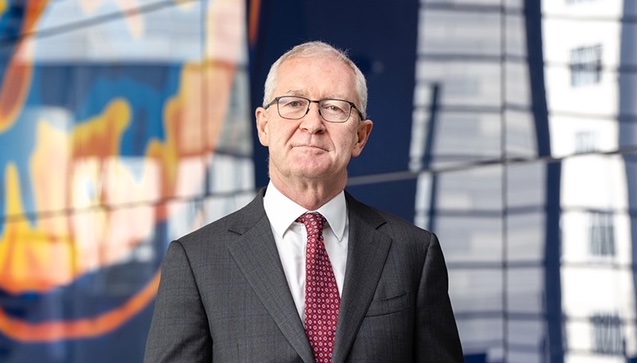Professor Hugh Brady, President of Imperial on the launch of the GBx Technology Innovation Impact Award

Q&A with Professor Hugh Brady, President of Imperial on the launch of the GBx Technology Innovation Impact Award, supported by Imperial
What is Imperial – and what are your plans in the US?
Imperial isn’t just a university; it’s a powerhouse of innovation and enterprise. We’re a global top-ten institution, recently ranked second in the world by the prestigious QS World University Rankings, renowned for cutting-edge research in science, technology, engineering, medicine and business (STEMB).
Innovation and enterprise are really part of Imperial’s DNA. This is where science and business meet, curiosity is sparked, innovation is born and groundbreaking discoveries are made.
Our new strategy – Science for Humanity – is all about making a real, positive impact on the world. We’re using our expertise to maximise Imperial’s potential as a global force for good, using science to try to understand more of the universe and improve the lives of more people in it.
We are pleased to be opening Imperial Global USA next month, a new Imperial office dedicated to building transatlantic networks and partnerships at the forefront of emerging and enabling technology and scientific discovery.
California, particularly the San Francisco Bay Area, is the natural place for Imperial to develop its US partnerships. It is the centre of tech innovation and global venture capital. Imperial’s world-leading STEMB research capabilities will be greatly enhanced by closer connections with this region, accelerating scientific advances.
How does the Technology Innovation Impact Award align with Imperial’s mission to translate cutting-edge research into real-world impact?
Many of the solutions to the most urgent and complex challenges that we face globally — like advancing clean tech and decarbonisation, building health resilience, and preserving biodiversity — are deeply rooted in fundamental science and engineering breakthroughs.
These innovations, known as “Deep Tech” or “Tough Tech”, are often underpinned by work in universities, like Imperial, on frontier technologies such as engineering biology, AI and robotics, quantum and biomaterials and medical devices.
The Imperial Technology Innovation Impact Award will recognise the most outstanding examples of deep science and technology innovations that have successfully navigated the journey from lab to the marketplace in the San Francisco Bay Area, driving economic growth and creating real societal benefits.
For Imperial, we are proud of our association with companies like PSI Quantum, a quantum computer company based in Palo Alto aiming to be the world’s first commercially viable one million qubit quantum computer. And the pioneering work of our alumni such as Wendy Tan White MBE, CEO of Intrinsic – an Alphabet company, working at the interface of AI and Robotics, or Peter Rawlinson, CEO of Lucid Motors, breaking boundaries in clean tech and electric vehicles.
How does the Award fit into Imperial’s strategy for promoting entrepreneurship and innovation?
We believe in the power of imagination to shape the world. Here at Imperial, our dedication to cutting-edge research sparks a culture of curiosity and innovation, paving the way for exciting new discoveries.
A leading deep tech innovation ecosystem depends on world-class discovery science, entrepreneurial talent, access to finance and supportive regulatory frameworks.
London and the San Francisco Bay Area are natural partners for collaboration across a number of fast-growing tech sectors, and our US hub will provide a vital connection point to London, UK and European talent, discoveries and ideas.
What are some of the key challenges facing the UK’s tech ecosystem, and how can institutions like Imperial help address them?
The UK has a thriving tech ecosystem and is widely recognised as an outstanding environment to start, grow and invest in tech. The concentration of world leading universities provides the engine room for transformative technologies, and Imperial is proud to be recognised and decorated in this regard.
We are incredibly proud of our Institute for Deep Tech Entrepreneurship, which is helping to turn groundbreaking research into real-world solutions. The institute is dedicated to understanding and addressing the key barriers to the successful commercialisation of Deep Tech ventures, building on Imperial’s entrepreneurial spirit, and our strong foundation in science, engineering, medicine and business.
We’re thrilled to be playing a key role in nurturing the growth of the entire Deep Tech ecosystem, by identifying and addressing the obstacles that can hinder the commercialisation of these advanced technologies
This includes facilitating pre-commercial funding and support for Deep Tech “moonshots”, whose needs are not currently being met through traditional technology translation models. We have ambitions to massively scale up this effort.
We’ve also worked with the Royal Academy of Engineering to launch an exciting new Science and Technology Venture Capital Fellowship. This will help investors spot and fund promising life science and deep tech ventures. Over the course of twelve months, participants will gain valuable knowledge and develop leadership skills, and benefit from hands-on experience, mentoring, and networking opportunities.
Can you describe some of the key technologies and sectors that Imperial is particularly focused on in terms of driving innovation and impact?
Artificial intelligence and machine learning, advanced materials, biomedical engineering, clean energy technologies, and quantum computing are all key areas for us. These fields represent the cutting edge of science and technology, and our researchers are making significant strides in each of them.
AI is already one of Imperial’s major strengths. We have nearly 1,000 researchers working on all sorts of AI projects across our departments and schools. To make the most of this expertise, we created I-X, our AI-focused digital foundry. Now, we’re building on that success to launch a new school of convergence science focused on human and artificial intelligence.
Our Imperial Global USA hub will develop partnerships with mutually beneficial opportunities across AI and Robotics, leveraging the data and insights, including our partnership with the UK’s National Health Service to inform med-tech and biotech innovation. I look forward to sharing examples of this.
Words by Professor Hugh Brady

